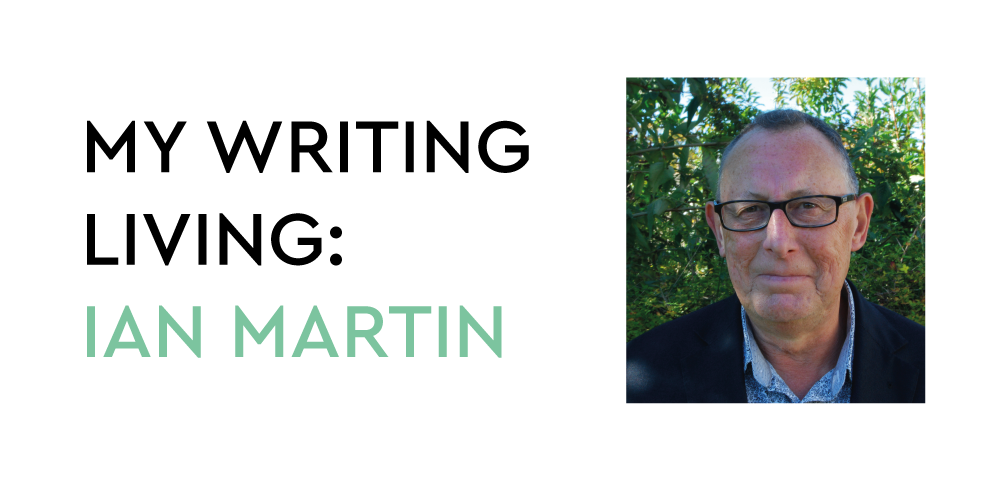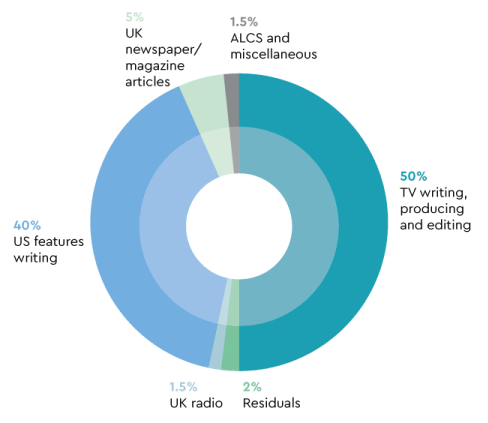MY WRITING LIVING: IAN MARTIN

The winner of the 2020 Tinniswood Award for Audio Drama tells us how he got his big break after years of grafting away in a cellar writing sweary jokes, and why winning a Tinniswood tops taking home an Emmy or a BAFTA.
“Fluke. Absolute fluke.” Down the line from his home in Lancaster, multi-award-winning writer Ian Martin is explaining how he made an unlikely move from trade journalism into writing for television, and thence to film and radio. Roundabout route it may have been, but his story is testament to the fact that sometimes, hard graft gets you where you want to be, or even where you never dreamed you’d be.
“Back in the 20th century, I wrote a long-running satirical column for the Architects’ Journal,” Ian tells me. “Someone at The Guardian spotted it, and commissioned me to do a similar column for G2. It was terrible – really, really bad – and quite rightly I was sacked after about two months of writing drivel. But at the time I was outraged. So my brother – who had recently been made redundant – and I decided to start a satirical website called Martian FM. It was only about 20 years ago, but at that time there was hardly anything on the internet apart from a vast desert of porn on one side, and weird and arcane scientific journals on the other. He did the layouts and I did all the writing. One of the features we created was called Hansard Lane which imagined the dialogue that might take place during very late night sessions of the House of Commons. It was very sweary.”
…then I got an email out of the blue which said: ‘Hi, I’m Armando Iannucci, I’m the producer of I’m Alan Partridge and The Day Today’, as if I might not know who he was. ‘I like your stuff, it makes me laugh’
After three years, during which time Ian worked on material for the website in the cellar, week in week out, someone told Armando Ianucci he ought to check it out. As luck would have it, Ianucci was just starting work on a new series called The Thick of It. “At the time we only had a couple of hundred weekly visitors to the site; it was pathetic,” remembers Ian. “But then I got an email out of the blue which said: ‘Hi, I’m Armando Iannucci, I’m the producer of I’m Alan Partridge and The Day Today,’ as if I might not know who he was. ‘I like your stuff, it makes me laugh.’ I thought it was a hoax. But I rang the number he gave and it was indeed him.”
Before long, Iannucci asked Ian contribute to The Thick of It. “He said: ‘Can I send you the first scripts to sprinkle your fairy dust of swearing over?’ The sweary fairy dust went down well and I was invited to join its team of writers. Since then, my association with Armando has been the pride of my comedy career. It was luck, sheer luck, followed by an ability somehow to take the break that was thrown my way and capitalise on it.” The Thick of It, with Ian as co-writer and ‘swearing consultant’, went on to win numerous awards including a BAFTA for Best Sitcom in 2010. Since then, Ian has worked on other feted TV series such as Veep for HBO which won a raft of Emmy Awards. He also co-wrote the film Death of Stalin with Iannucci and David Schneider, which won the Empire Award for Best Film and was nominated for a BAFTA.
winning the Tinniswood honestly meant the most to me of any of the stuff I’ve won: I was the most surprised and most gratified I’ve been in my entire career.
But among these many awards, pride of place goes to Ian’s recent Tinniswood Award for his radio play, The Hartlepool Spy, produced by Sam Ward for BBC Radio 4. “The Hartlepool Spy was entirely my thing, and it was done for peanuts and for love. In fact everyone involved did it for love and not money. And even though I realise I’m in a position to do work like this because I’m fine for money, winning the Tinniswood honestly meant the most to me of any of the stuff I’ve won: I was the most surprised and most gratified I’ve been in my entire career. The whole process of working with my fantastic producer Sam Ward to create a story with no visual aids whatsoever was a really exciting thing to do. I’d love to do more radio in future.”
I ask Ian if he has any advice for audio-visual writers at the start of their careers, based on his own stellar CV. “Well of course I do feel guilt about taking work away from young vital writers because I am old and gnarled,” he quips. “It depends what kind of hindsight we’re using. At the time my big break came in 2003, I thought, well this proves that with the website we were doing something unignorable. But when I think about it now, almost 20 years later, I see the lesson much more as: keep grinding away, week after week, with very little in the way of feedback but just with the sense that you are good enough. With Martian FM we had the self-belief that what we were doing was unique and funny, and in fact our work anticipated a wave of particularly heartless humour. Yes, I had a hugely lucky break but that wouldn’t have happened if we hadn’t been grinding that stuff out for three years. So unless you actually believe you’ve got some kind of talent, what’s the point?”
This kind of dogged self-belief has sustained Ian through lean and difficult times as a writer. He’s weathered more than one recession; at one point in the 1990s he tells me that 96% of his earnings were wiped out. “We were always in debt,” he says. Only in 2005 was he able to give up freelancing for magazines. Currently he is working on six live projects, all of which are at different developmental stages. “If I was working on only one, the chances are I’d be stuck in development hell. So there’s a kind of elasticity involved on both sides – everyone understands that writers have several things going on at once, but also as a writer you have to understand that you sometimes have to drop everything else for whoever needs your work most urgently.”
Ian’s average income sources:

And what, so far, has been the effect of the current COVID-19 lockdown on his work? “It’s still a bit early to know how much the Pestilence will cancel work. An HBO show I’m working on was due to be in rehearsal during early summer and that’s been put back provisionally by about three months. Stuff that’s at the pilot stage which could go one way or another will probably go nowhere for so long it becomes mulch anyway. Projects in production have been paused. As it happens, I’m working on a second-stage pitch for a radio sitcom, a political satire set in the 8th century, and I have to admit the background of a Great Plague has suddenly given it an appalling, if opportunistic, resonance.”
“In the end, it’s about graft. I write every day: you have to do that. Even if a lot of what you produce goes down the sinkhole, some of it will get used.”
Interview by Caroline Sanderson
